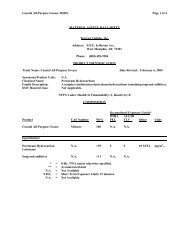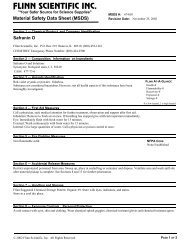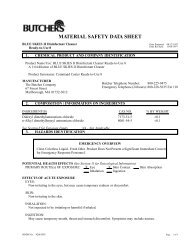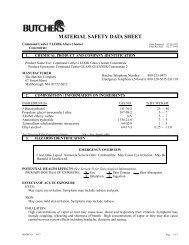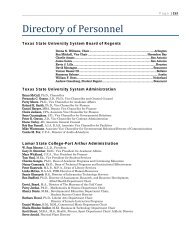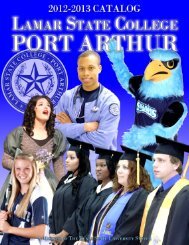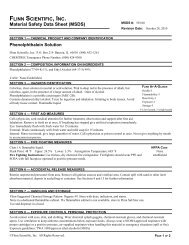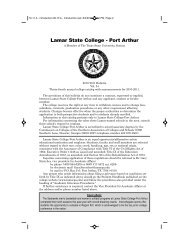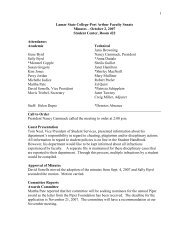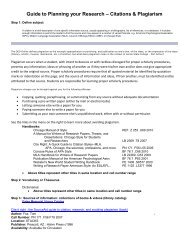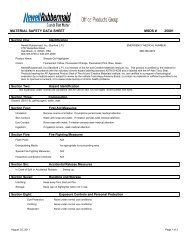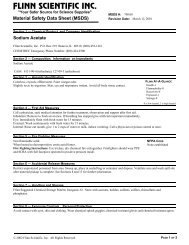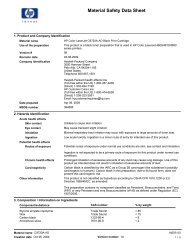Download Full Catalog ~ 6.6 MB - Lamar State College - Port Arthur
Download Full Catalog ~ 6.6 MB - Lamar State College - Port Arthur
Download Full Catalog ~ 6.6 MB - Lamar State College - Port Arthur
Create successful ePaper yourself
Turn your PDF publications into a flip-book with our unique Google optimized e-Paper software.
Page | 62<br />
7. Unattended portable computing devices must be physically secure. This means they must be locked in an<br />
office, locked in a desk drawer or filing cabinet, or locked in a secure, out-of-sight area of a vehicle. (TAC<br />
202.75.7.Q)<br />
5.1<strong>6.6</strong> System Development and Auditing – Authority-TAC 202.71; 202.75<br />
1. The Information Technology Services Department is responsible for developing, maintaining, and participating<br />
in a System Development Life Cycle (SDLC) for college system development projects. All software developed<br />
in-house which runs on production systems must be developed according to the SDLC. At a minimum, this plan<br />
should address the areas of preliminary analysis or feasibility study; security implications; risk identification<br />
and mitigation; systems analysis; general design; detail design; development; quality assurance and acceptance<br />
testing; implementation; and post-implementation maintenance and review. This methodology ensures that<br />
the software will be adequately documented and tested before it is used for critical college information. (TAC<br />
202.75.6.B, 202.75.7.D, 202.75.7.U, 202.75.7.W)<br />
2. All production systems must have designated owners and custodians. (TAC 202.71.c)<br />
3. All production systems must have an access control system suited to the classification of data stored on the<br />
system as determined by the risk analysis process. (TAC 202.75.3.C)<br />
4. Where resources permit, there shall be a separation between the production, development, and test<br />
environments. All development and testing environments must utilize sanitized data or maintain the same<br />
security access as the production system. (TAC 202.75.6.A)<br />
5. All application-program-based access paths other than the formal user access paths must be deleted or<br />
disabled before software is moved into production. (TAC 202.75.7.D)<br />
6. Information resources systems shall provide the means whereby authorized personnel have the ability to audit<br />
and establish individual accountability for any action that can potentially cause access to, generation of,<br />
modification of, or affect the release of Category-I data. (TAC 202.75.5.A)<br />
7. Appropriate audit trails shall be maintained to provide accountability for updates to Category-I data and<br />
related hardware and software, and for all changes to automated security or access rules. (TAC 202.75.5.B)<br />
8. Based on the risk assessment completed by the ISO, a sufficiently complete history of transactions shall be<br />
maintained to permit an audit of the information resources system by logging and tracing the activities of<br />
individuals through the system. (TAC 202.75.5.C)<br />
9. Where possible a logon banner/warning should be presented when a user logs on to a system. The ISO shall<br />
approve the content of the banner/warning. (TAC 202.75.9)<br />
5.16.7 Acceptable Use – Authority – TAC 202.70; 202.75<br />
1. <strong>Lamar</strong> <strong>State</strong> <strong>College</strong> – <strong>Port</strong> <strong>Arthur</strong> information resources are finite by nature. All users must recognize that<br />
certain uses of college owned information technology resources may be limited or regulated as required to<br />
fulfill the college’s primary teaching, research and public service missions.<br />
2. Users must report any weaknesses in computer security, any incidents of possible misuse or violation of this<br />
agreement to the Information Security Officer. (TAC 202.75.7.A)<br />
3. Users must not attempt to access any data or programs contained on college systems for which they do not<br />
have authorization or explicit consent to do so. (TAC 202.75.7.A)<br />
4. Users must not share their college account(s), passwords, Personal Identification Numbers (PIN), Security<br />
Tokens (i.e. Smartcard), or similar information or devices used for identification and authorization purposes.<br />
(TAC 202.75.7.A)<br />
6. Users are responsible for all actions that take place with their account. (TAC 202.70.3)<br />
7. Users must distinguish between ideas, comments, and opinions of the individual user versus those that<br />
represent the official positions, programs, and activities of the college.<br />
8. The college is not responsible for the content of documents, exchanges or messages, including links to other<br />
information locations on the internet or world wide web, that reflect only the personal ideas, comments and<br />
opinions of individual members of the college community, even where they are published or otherwise<br />
circulated to the public at large by means of college information technology resources.<br />
9. Students, faculty and staff using information technology resources for purposes of exchanging, publishing or<br />
circulating official institutional documents must follow LSC-PA requirements concerning appropriate content,<br />
style and use of logos, seals, or other official insignia.<br />
10. Users of college information resources must not use any software not provided by the college without<br />
Information Technology Services Department approval. (TAC 202.75.7.V)<br />
11. Users must not purposely engage in activity that may: harass, threaten or abuse others; degrade the<br />
performance of college information resources; deprive an authorized <strong>Lamar</strong> <strong>State</strong> <strong>College</strong> - <strong>Port</strong> <strong>Arthur</strong> user<br />
access to a college resource; obtain extra resources beyond those allocated; circumvent any computer security<br />
measures. (TAC 202.75.7.A)<br />
12. Users must not download, install or run security programs or utilities that reveal or exploit weaknesses in the<br />
security of a system. For example, users must not run password cracking programs, packet sniffers, or port<br />
scanners or any other non-approved programs on college information resources. (TAC 202.75.7.V)<br />
13. <strong>Lamar</strong> <strong>State</strong> <strong>College</strong> - <strong>Port</strong> <strong>Arthur</strong> information resources must not be used for personal benefit, political<br />
lobbying or campaigning. (TAC 202.75.7.A)



